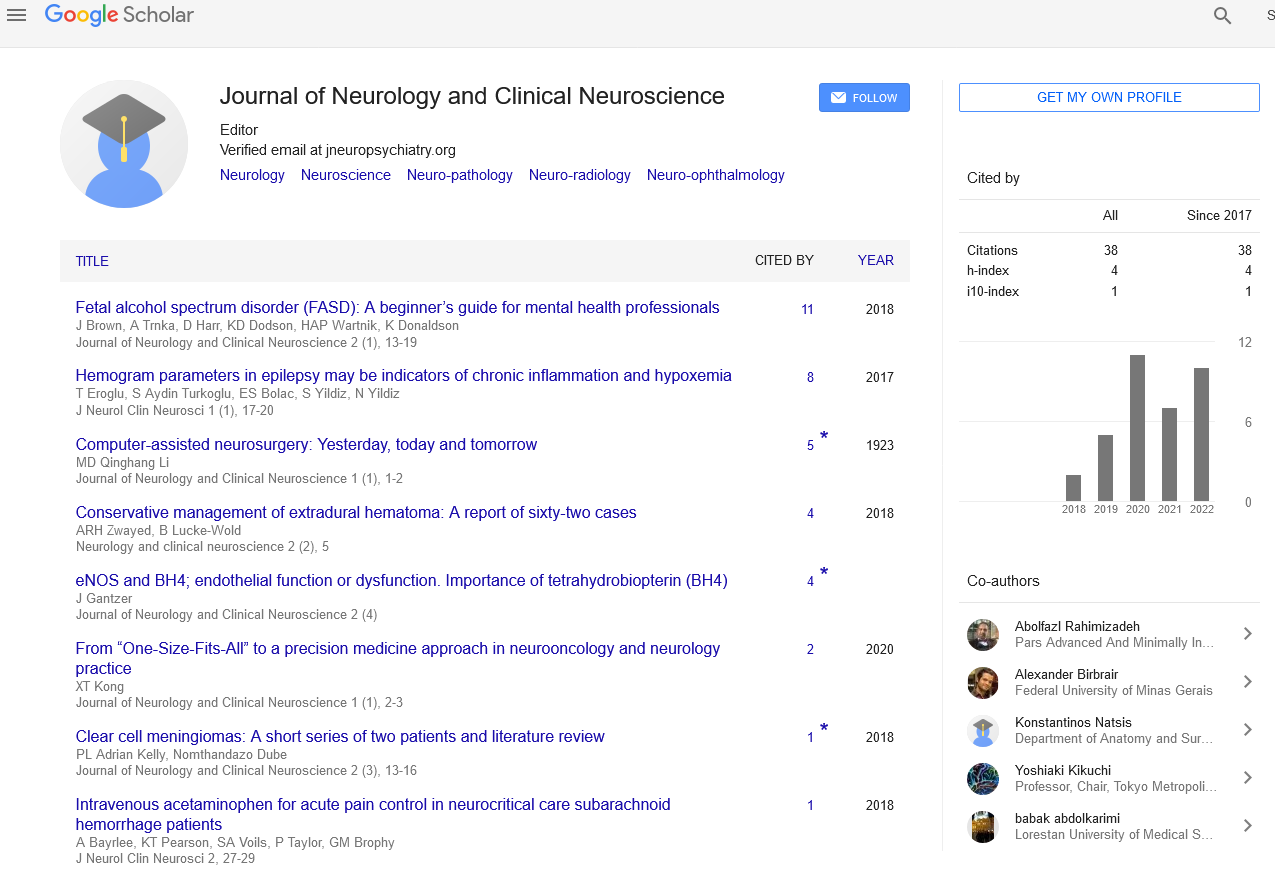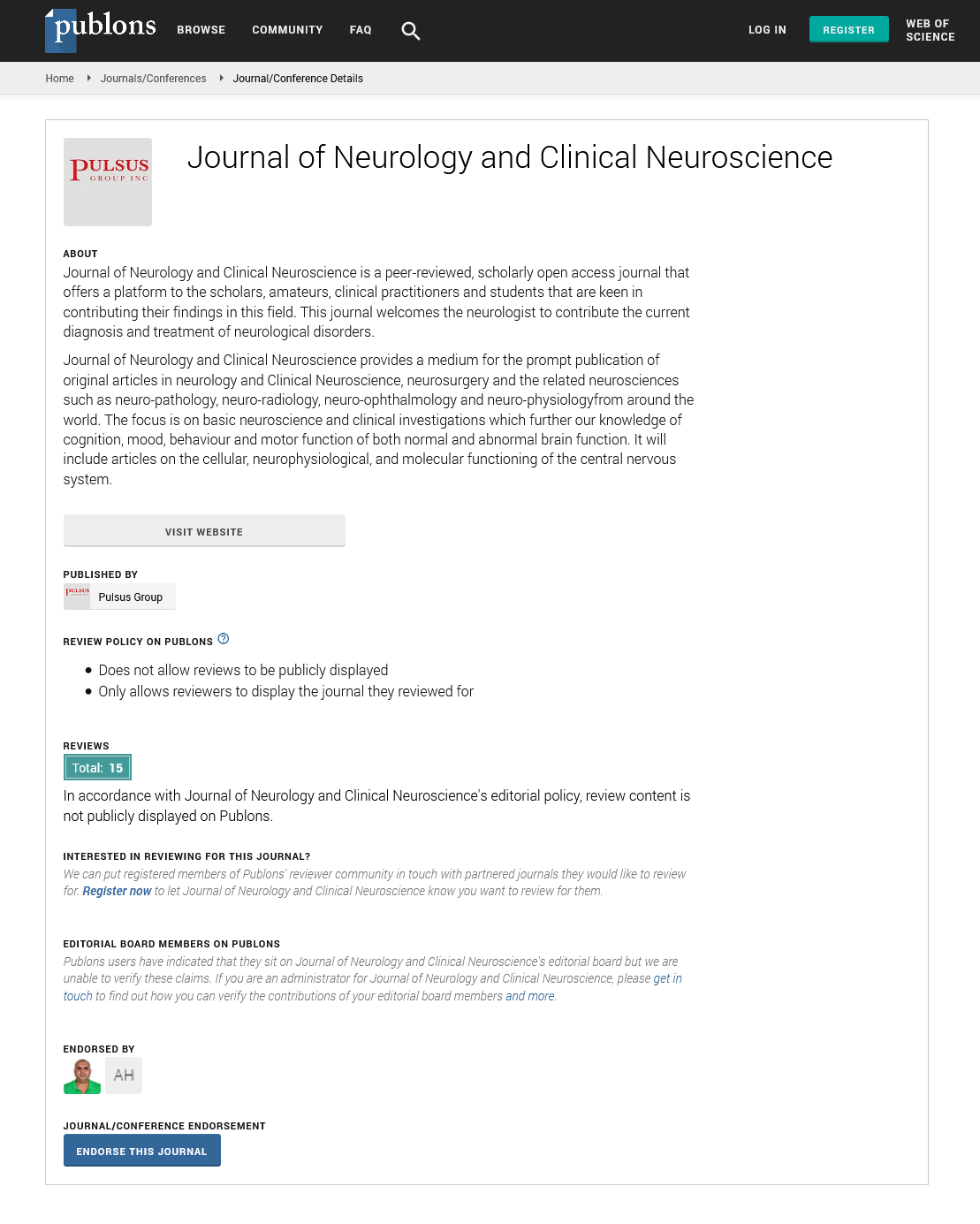Sign up for email alert when new content gets added: Sign up
Hasad Khabees (Malicious Envy), Ghibtah (Descent Envy) and Shamatah (Schadenfreude): Insight from Scriptures and Medical Sciences
Webinar on 7th International Conference on Neuroscience and Neurological Disorders
March 18-19, 2022 | Webinar
Iqbal Akhtar Khan
Independent Scholar, Pakistan
Posters & Accepted Abstracts: J Neurol Clin Neurosci
Abstract :
Introduction: Hasad is an Arabic word which has been used in Holy Quran with different meanings, according to the context. It is widely accepted substitute in English is Envy which has been defined by the American Psychological Association as: “a negative emotion of discontent and resentment generated by desire for the possessions, attributes, qualities, or achievements of another (the target of the envy)”. The Envy, a complex and perplexing passion, is simultaneously a fascinating and a dreadful emotion with positive and negative facets depending upon the doctrine of Khair (good) and Sharr (evil). It has been discussed under two entities: Descent (or Benign, Emulative, Admiring, White). It is a morally laudable approach, with productive and motivational tendencies. It is also called Ghibtah which is defined as the wish for oneself the same blessing without any idea of the latter, losing it. This is not only permissible but also desirable. Malicious (or Invidious, Destructive, Black, Envy Proper). It is a morally reproachable approach with frustrating and negative feelings. It is actively malevolent, being focused on pulling down the envied to own level and believing oneself to be capable of taking the good away from the envied taken as a rival. Its Arabic equivalent is Hasad Khabees. The effects of malicious envy, on the envied, are detrimental ranging from mental anguish and physical damage (temporary or lifelong) to taking life as is evident from the history. For the envier, the envy, itself is a punishment both bodily and spiritually. The malice of the envier ultimately turns against its own self and destroys the personality of the envier before destroying the envied one. Schadenfreude, the feeling of satisfying disdainfulness, is a compound of the German nouns Schaden, meaning "damage" or "harm", and Freude, meaning "joy”. It is, therefore, joy over some harm or misfortune suffered by another. Its Arabic equivalent is Shamatah which means joy over the affliction of the opponent. It has been shown that the actuating force or the inciting factor for schadenfreude is malicious envy. The current set of studies, as wrapped up by van de Ven, et al, conclude that schadenfreude is independent of other known antecedents such as perceived unreservedness of the other’s advantage, disliking of the other, anger, and inferiority. Historical Considerations: It is a historic fact that the malicious envy, the root of all evils, is the first sin to be committed in the celestial realm and also the first one on the face of earth. The Holy Quran tells us four stories, linked to malicious envy: the story of Satan, refusing to obey command of the Almighty to prostate before Adam, another wicked act of Satan who beguiled Adam and his wife while they were in paradise. The third story is about the murder of one son of Adam by the other. The fourth story is of Prophet Yousaf (Joseph) who was victim of malice by his stepbrothers. As described in Ramayana (Hindu sacred text), Lord Ram (a major deity in Hinduism) fell victim to malicious envy of his stepmother and had to be exiled for 14 years. Theological considerations: All the five major religions (Christianity, Islam, Buddhism, Hinduism, and Judaism) condemn malicious envy. The theologians rate it among disastrous emotions, detestable sins and vices. The book of Proverbs, examples of traditional Biblical Wisdom, has an elevating influence on the intellect of the readers: 1. “Wrath is cruel, and anger is outrageous, but who is able to stand before Envy?” - Proverb 27:4 AKJ Version 2. “A heart at peace gives life to the body, but Envy rots the bones” - Proverb 14:30 NI Version Whereas the distribution of bounty is entirely at the discretion of The Supreme Bestower, the ‘Chapter 16- al- Nahal’ of Holy Quran explains it as “God has caused some of you to excel in earning livelihood over others” {16:71}. The envier, by protesting against the divine distribution, in practice refutes the Decision-Making Attribute of The Almighty, The All-Giver and The All-Wise. The Last Messenger has advised to take refuge from God for the difficulties of severe calamities, having an evil end and a bad fate and from the malicious joy of enemies (Hadith 6616–Sahih Bukhari).Anatomical Considerations The identification of ‘Envy Spot on the Brain’ is a marvellous scientific discovery which proposes a neuro-cognitive mechanism of a psychologically rewarding reaction, schadenfreude and its relation to malicious envy. The key findings by Takahashi et al were: • Stronger dACC (dorsal Anterior Cingulate Cortex) activation was observed when one felt stronger envy. • At the behavioural level stronger schadenfreude was related to stronger envy. • Schadenfruede arose when misfortune occurred to a person who was advantaged and self-relevant. • Striatal activation was observed when misfortune happened to an envied person but not when it happened to a non-envied one. Future Considerations: It is tempting to postulate that the surgical procedure ‘Deep Brain Stimulation’, presently employed successfully to treat a variety of disabling neurological symptoms (mainly of Parkinson’s Disease), will be able to treat envy, and the dream of an ‘envy free set up’ would become a reality. Conclusion: Envy is a social-comparison-based emotion which , according to Dorothy Sayers, is the Great Leveller: If it cannot level things Up it will level them Down”. Whereas the pulling down motivation ends in Hasad (Malicious Envy), the pulling up stimulus results in Ghibtah (Decent Envy). A praiseworthy advice is from Imam Ghazali “What is destined (for you) will reach you, even if underneath the two mountains. Conversely, what is not destined (for you), will not reach you, even if between two lips”. Regarding Schadenfreude, there is warning from The Last Messenger: Do not rejoice over the misfortune of your brother (envied), lest Almighty God has mercy upon him and subject you to trials” (Sunan Tirmidhi 2506).
Biography :
Iqbal Akhtar Khan is the Professor and Chair of the University College of Medicine, the University of Lahore, Pakistan. He has done many kinds of research in the field of Ibn Sina Medicine and has reached great milestones.





